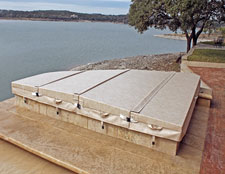
A German chemist first invented polyvinyl chloride (PVC) in 1872, and while patented in 1913, there was no known use for the product. It wasn’t until 1926 brought improvements in the material that uses were discovered. While attempting to create an adhesive to bond rubber and metal, B.F. Goodrich researcher Waldo Semon accidentally invented plasticized PVC. Due to its waterproof properties and the scarcity of rubber, PVC was instrumental in protecting wires on Navy ships during World War II before it eventually transitioned to commercial uses.
Vinyl fabric comes in three standard types: non-backed, non-expanded, and expanded. Non-backed vinyl is typically used in the auto industry for trim areas, while non-expanded vinyl has a lighter weight backing used for tablecloths, bar stools, tarps, and applications that experience limited wear. Expanded vinyl is the most substantial and commonly used for upholstery, as it is able to withstand the wear of commercial applications.
More durable than standard vinyl, marine-grade vinyl has unique resistances to outdoor elements that make it suitable for nearly any outdoor application

Why Marine Vinyl?
Marine-grade PVC is resistant to abrasion and may be coated to make it resistant to mildew, bacteria, and damage or fading from UV rays. Marine grade vinyl is durable enough to withstand extreme temperatures, exposure to direct sunlight, and moisture. The durable fabric is also stain-resistant and easy to clean.
While many fabrics are merely water-resistant and can withstand limited amounts of exposure to water, marine fabric vinyl is fully waterproof. It will retain its appearance and continue to protect from mold and mildew long after other fabrics have succumbed to the elements.
These properties make it ideal for marine applications, unlike other vinyl materials such as:
- Standard vinyl lacks the UV protection offered by marine vinyl and may be prone to mold and mildew growth in outdoor applications.
- Automotive vinyl is also durable, though it lacks many of the resistances offered by marine vinyl. Automotive vinyl instead focuses on aesthetics, such as a leather-like feel and appearance.
- Decorative vinyl is often used as a leather substitute as well. It also withstands moisture and holds color fairly well, which makes it popular for outdoor furniture and fashion accessories.
Applications for Marine-Grade Vinyl
Marine grade vinyl can is ideal for use in many applications. The most obvious application is in the boating industry, where boats undergo near-constant exposure to water, sunlight, and other harsh conditions. Marine applications require fabrics that provide the highest level of resistance to weather and sunlight while maintaining the integrity of the material.
Beyond boat seat material, marine vinyl fabric is suitable for many other marine applications as well, such as:
- Awnings
- Boat enclosures
- Bimini boat covers
- Window treatments
Contact the Marine Vinyl Suppliers at Adams Plastic
Marine-grade vinyl is highly durable and suitable for marine environments and other outdoor application where the fabric will have to endure extreme weather conditions. At Adams Plastic, we offer the highest quality marine-grade vinyl available to fit your specific needs.
To learn more about the marine vinyl products available at Adams Plastic, please contact us to request your quote or sample.



